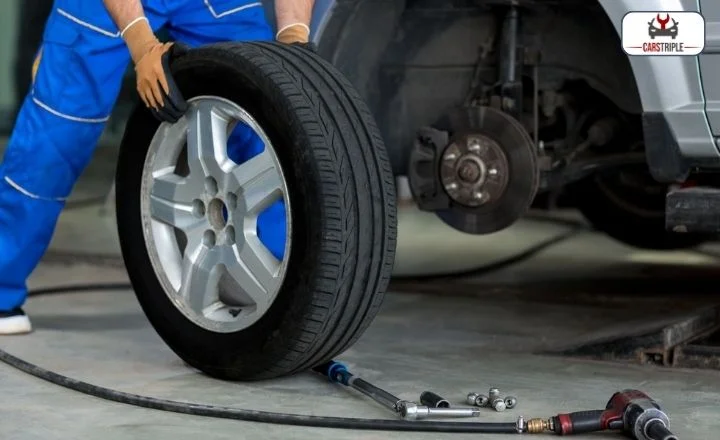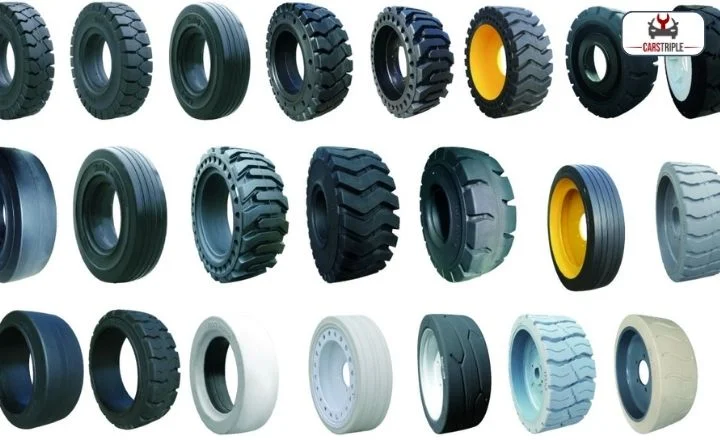Tire plugs are convenient and cost-effective for fixing punctures, but their longevity is often debated among drivers. Whether you’ve found yourself stranded on the side of the road with a flat tire or simply curious about how long a temporary fix can last, understanding the durability of tire plugs is essential for every vehicle owner.
This guide will explore: How Long Do Tire Plugs Last? From the type of puncture to the quality of the plug and even environmental conditions, numerous variables are at play when assessing the lifespan of these handy repair tools. So buckle up as we embark on this journey to uncover how far tire plugs can go to keep us rolling smoothly on our adventures.
What is a Tire plug?
A tire plug is a simple but ingenious solution to a common problem: punctured tires. Made from rubber or other durable materials, tire plugs are inserted into the puncture hole of a tire to seal the damage and prevent air leakage. Unlike patching, which involves removing the tire and applying adhesive, tire plugs can be easily installed on-site without any special equipment.

When it comes to the longevity of tire plugs, their effectiveness largely depends on the size and location of the puncture, as well as how carefully they are installed. In general, high-quality tire plugs can provide a reliable temporary fix for small punctures caused by nails or screws.
How Long Do Tire Plugs Last?
A tire plug’s lifespan can be a concern for many drivers. While it’s true that a well-installed tire plug can last for thousands of miles, several factors can affect its longevity. It’s essential to consider the size and location of the puncture, as well as the quality of the repair. Also, driving conditions and maintenance habits determine how long a tire plug lasts.
This is particularly true if the puncture is near the sidewall or the tire experiences frequent exposure to extreme temperatures or rough road conditions. It’s also worth noting that while plugs can provide reliable temporary fixes, they are not intended as permanent solutions. Regular inspections and proper care are essential to maximize the lifespan of a tire plug and ensure safe driving experiences.
Maintaining proper tire pressure, avoiding hazardous road debris, and promptly addressing any punctures with high-quality repairs can significantly extend the life expectancy of a plugged tire. By staying vigilant and proactive in maintaining your tires, you can minimize potential risks and enjoy longer-lasting results from your tire plugs.
Is plugging a tire a good idea?
Plugging a tire can be a tempting and effective short-term solution to a tire puncture, especially when faced with a large or sidewall-located puncture. It’s essential to consider the limitations of this temporary fix. While tire plugs can seal the puncture and get you back on the road quickly, they are meant as a temporary solution and should not be seen as a permanent fix.
Tire plugs are designed to last several thousand miles under usual driving conditions. Remember that they do not address any internal damage that may have occurred to the tire itself. Driving on a plugged tire for an extended period of time can lead to further complications or even compromise safety.

Therefore, while plugging a tire can be an effective short-term solution, having the tire professionally inspected and potentially repaired or replaced for long-term safety and performance is essential.
Is it safe to plug in a tire?
Plugging a tire can be a temporary fix for a puncture, but is it safe in the long run? While tire plugs can quickly fix small punctures, they are not considered a permanent solution. The effectiveness of a tire plug depends on factors such as the size and location of the puncture and the quality of the plug itself. It’s important to remember that a plugged tire may not have the same level of reliability and safety as one professionally repaired or replaced.
Tire plugs are known for their longevity. Many drivers wonder how long they can expect a tire plug to last before needing further attention. The lifespan of a tire plug varies depending on driving conditions, road surfaces, and other external factors.
While some plugs may hold up well for thousands of miles, others may fail sooner. It’s crucial to monitor plugged tires closely and have them inspected by a professional if any concerns arise.
When considering whether to plug a tire or opt for more extensive repairs or replacements, drivers should consider their specific circumstances and prioritize safety above all else. While plugging is convenient and cost-effective in the short term, investing in proper repair or replacement may offer greater peace of mind regarding reliability and longevity on the road.
How do I plug in a tire?
Plugging a tire is an essential skill for any driver, but it’s important to do it right to ensure long-lasting results. When plugging a tire, locate the puncture and remove any debris from the hole using a reamer tool. Then, insert the tire plug firmly with a plug insertion tool, ensuring it sits flush with its tread. To secure the plug in place, trim any excess length and apply rubber cement around the plug for added sealing power.

How long do tire plugs last? Well, adequately installed tire plugs can last thousands of miles if done correctly. Factors such as driving conditions and maintenance can impact their longevity. It’s crucial to inspect plugged tires for signs of wear or leakage regularly and have them professionally repaired if needed to ensure safety on the road.
Effectively plugging a tire is empowering and cost-effective. By understanding proper techniques and care routines, drivers can maximize the lifespan of their plugged tires and travel worry-free on their journeys.
How Long Can I Drive On A Tire With A Plug?
Tire plugs can temporarily fix a punctured tire, but their longevity depends on several factors. The location and size of the puncture, as well as the type of plug used, will all play a role in determining how long you can drive on a plugged tire.
Tire plugs are considered a short-term solution and are not meant to be permanent. Having your tire professionally inspected and repaired as soon as possible after using a plug is recommended. A tire plug may last several hundred miles without any issues, while it may fail sooner in other instances. Factors such as driving speed, road conditions, and temperature can all impact the plug’s effectiveness.
It’s essential to remember that relying solely on a tire plug for an extended period increases the risk of experiencing blowouts or further damage to the tire. Ultimately, it’s best to view tire plugs as an interim fix and prioritize adequately repairing or replacing your tire as soon as possible.
Is It Safe To Drive With A Plugged Tire?
Driving with a plugged tire can be risky and potentially dangerous. While it may seem like a quick fix, the reality is that a plug is only considered a temporary solution. A plugged tire may not have the same stability and reliability as an unblemished one. The strength and integrity of the tire can be compromised, leading to potential blowouts or loss of control while driving.

They are designed as a short-term fix until the tire can be adequately repaired or replaced. Factors such as speed, distance travelled, and road conditions can all impact how long a tire plug will last. Drivers must understand that relying on a plugged tire for an extended period could pose serious safety hazards on the road.
Safety should always be the top priority for vehicle maintenance. While it may be tempting to continue driving with a plugged tire, addressing the issue promptly requires professional assistance from qualified mechanics or technicians who can provide proper repairs or replacements for damaged tires.
Is plugging a tire a permanent fix?
Tire plugging is a standard method for repairing punctures, but is it a permanent fix? While tire plugs can effectively seal small punctures and provide temporary relief, they are not considered a long-term solution. The effectiveness of a tire plug largely depends on the size and location of the puncture. The type of plug used and how it is installed can also impact its longevity.
Tire plugs are designed to be temporary, offering enough support to get you safely to a mechanic for proper repairs. Depending on various factors, such as driving conditions and maintenance practices, a properly plugged tire can last from several days to several months. Remember that driving on a plugged tire for an extended period can pose safety risks and further damage the tire.
While plugging a tire can provide immediate relief, viewing it as a temporary solution is essential. To ensure your tires’ long-lasting safety and performance, it’s essential to have them professionally inspected and repaired by trained professionals when necessary.
Do tire plugs wear out?
Tire plugs are an effective and economical solution for fixing punctures, but do they wear out over time? The consensus is that tire plugs do have a limited lifespan. Factors such as the type of plug used, the quality of the installation, and the driving conditions can all affect how long a tire plug will last.

While some plugs may hold up for a few thousand miles without issues, others may deteriorate much sooner. It’s important to note that even though tire plugs might seem to be holding up well on the surface, they can degrade internally due to heat, moisture, and road debris exposure.
Continuous use of a plugged tire can increase stress on the plug itself and the surrounding area, potentially shortening its lifespan. To ensure safety on the road, it’s crucial for drivers to regularly inspect their plugged tires for signs of wear or damage and replace them when necessary.
What Happens If a Tire Plug Fails?
When a tire plug fails, the consequences can range from inconvenient to dangerous.
- First and foremost, a failed tire plug can result in a sudden loss of air pressure, leading to a flat tire while driving.
- This disrupts your plans and poses a safety hazard, especially on a busy highway or unfamiliar road.
- The failure of a tire plug may expose the puncture site to dirt and debris, leading to potential contamination and further damage within the tire.
In terms of longevity, while some tire plugs can last for thousands of miles without issue, others may fail prematurely due to factors such as excessive heat or overloading. Inspecting your plugged tire regularly for signs of leakage or wear and tear is crucial. Understanding the risks associated with failing tire plugs emphasizes the importance of proper maintenance and monitoring to ensure safe road travel.
Can a Plugged Tire Blowout?
A plugged tire can potentially blow out if the plug fails to seal the puncture properly. While tire plugs are a common and quick fix for small punctures, they are not always a reliable, long-term solution.
Factors such as inadequate sealing of the hole, improper application of the plug, or damage to the tire’s inner lining can all contribute to an increased risk of blowout. It is recommended to have a professional inspect any plugged tires at regular intervals and consider replacing them with proper tire repairs or replacements when necessary.
While a plugged tire can hold for a short time, there is always a risk of blowout if the plug becomes compromised. It’s crucial to prioritize safety by staying mindful of the limitations of tire plugs and seeking professional assistance when dealing with punctured tires. Regular maintenance and prompt replacement will ensure safer driving experiences in the long run.
Can a tire plug cause a slow leak?
Tire plugs are a standard solution for repairing minor punctures, but can they cause a slow leak? While tire plugs are designed to provide a temporary fix for small punctures, there is always a risk of the plug failing over time.
Factors such as the tire’s age, the puncture’s location and size, and the plug’s quality can all contribute to potential issues. Tire plugs may develop leaks if they were not installed correctly or if there was damage to the surrounding area during installation.

Many experts recommend monitoring plugged tires regularly and having them inspected by a professional to ensure their integrity. Tire plugs should only be considered a temporary fix until a proper repair or replacement can be made. Understanding how long tire plugs last can help drivers make informed decisions about their maintenance and safety on the road.
How Can I Extend the Lifespan of My Tire Plug?
When it comes to extending the lifespan of your tire plug, there are a few key factors to keep in mind.
- Proper installation is crucial. Ensuring the plug is securely and correctly placed can significantly impact its longevity.
- Regularly inspecting your tire for any signs of wear or damage can help you catch potential issues early on, allowing you to address them before they worsen.
- Be mindful of your driving habits to prolong your tire’s lifespan.
- Aggressive acceleration and braking, as well as sharp turns, can put extra strain on the plugged area of your tire.
- By practising smooth and cautious driving techniques, you can reduce unnecessary stress on the plug and increase its durability.
- Monitoring your tire pressure is essential for maintaining the plug’s effectiveness.
- Properly inflated tires can help prevent excessive flexing and movement in the plugged area, preserving its integrity for extended periods.
By prioritizing proper installation, cautious driving habits, and regular tire pressure maintenance, you can extend the lifespan of your tire plug and maximize its effectiveness over time.
Is a tire plug visible?
Regarding tire plugs, the visibility factor is a common concern. Many drivers wonder if a tire plug will be visible once it is installed. The answer is that, in most cases, a tire plug will be visible. This is because the plug is typically inserted from the outside of the tire and remains in place as a small protrusion or patch. Modern advancements have led to transparent or colour-matched plugs that are less noticeable.
Another important consideration for drivers is how long tire plugs last. Many manufacturers and experts suggest that a well-installed tire plug can last for the tire’s lifetime. It’s crucial to regularly inspect plugged tires for signs of wear or leakage to ensure continued safety on the road.
While tire plugs are generally visible once installed, advancements in materials and design make them less intrusive. With proper installation and maintenance, tire plugs can offer long-term solutions for minor punctures without compromising safety or performance on the road.
Can all types of tires be plugged in?
When faced with a punctured tire, the first instinct may be to reach for a tire plug as a quick and convenient solution. It’s essential to understand that not all types of tires can be safely plugged.
Most manufacturers recommend against plugging certain types of tires, such as run-flat or low-profile tires, due to safety concerns and the risk of compromising the tire’s integrity. These tires are designed with specific construction and materials that may not respond well to traditional plugs and could lead to further issues.

Even for tires compatible with plugs, longevity is still a question. While tire plugs can temporarily fix minor punctures, they are not intended as a permanent solution. The lifespan of a tire plug can vary depending on factors such as the size and location of the puncture, driving conditions, and maintenance practices.
Tire plugs may sometimes last for thousands of miles without any issues; in others, they may only hold up briefly before needing professional repair or replacement. Therefore, it’s crucial to monitor plugged tires closely and always consult with an expert when in doubt about their long-term viability.
Can multiple plugs be inserted into the same tire?
Inserting multiple plugs into the exact tire is not recommended, as it can compromise the tire’s integrity and pose safety risks. While a single plug may temporarily fix a minor puncture, inserting multiple plugs might lead to an uneven distribution of pressure and instability while driving.
Each new plug increases the likelihood of further damage to the tire’s inner structure, which could result in a blowout or a sudden loss of air pressure. Tire plugs are generally considered a temporary fix and are not meant to be a permanent solution.
The lifespan of tire plugs largely depends on factors such as driving conditions, frequency of use, and the severity of the original puncture. Therefore, it’s advisable to have any punctured tire professionally inspected, repaired, or replaced as soon as possible for optimal safety on the road.
What Are the Alternatives to Plugging a Tire?
Many drivers immediately consider using a tire plug as the go-to solution when dealing with a punctured tire. Some alternatives can also effectively repair a puncture.
- One alternative is using a patch and plug combination, which involves inserting a combination patch and plug into the tire from the inside. This method provides an extra layer of protection against air leakage and is often considered more durable than just using a traditional plug alone.
- Another alternative to plugging a tire is using tire sealant, which comes in liquid form and is injected into the tire through the valve stem. The sealant then coats the inside of the tire and seals punctures as they occur.
This method can be convenient for temporary fixes but may not be as long-lasting or reliable as other repair methods. Ultimately, considering factors such as how long tire plugs last should inform your decision when choosing between these alternatives to plugging a tire.
Multiple options are available for repairing a punctured tire beyond simply using a traditional plug. Each alternative has advantages and drawbacks based on durability and ease of application. Understanding how long different repair methods last can guide you in selecting the most suitable option for your situation.
Are tire plugs legal?
Tire plugs are widely used for repairing punctured tires, but the legality of using tire plugs varies depending on location and circumstances. Using tire plugs as a temporary fix is legal as long as the plug meets specific safety standards and does not compromise the overall integrity of the tire. Some jurisdictions may have specific regulations regarding tire plugs, especially in commercial vehicles or public transportation.
One common concern about tire plugs is their longevity and effectiveness. While they offer a quick and convenient solution for minor punctures, it’s essential to recognize that they are typically considered temporary fixes. How long do tire plugs last? This often depends on factors such as the size of the puncture, driving conditions, and proper installation.
A well-installed plug can last thousands of miles without issues in ideal conditions. It’s crucial to remember that a professional inspection and permanent repair or replacement should be sought as soon as possible to ensure long-term safety on the road.

Can a tire plug kit be used for any puncture?
When it comes to tire punctures, a tire plug kit can be a convenient solution for many scenarios. It’s essential to understand that not all punctures are created equal. The effectiveness of a tire plug kit largely depends on the size and location of the puncture. More minor punctures in the tread area often lend themselves well to being repaired with a tire plug, providing an effective temporary solution until the tire can be professionally inspected.
Viewing tire plugs as a temporary remedy rather than a long-term fix is essential. Punctures near the sidewall or shoulder of the tire may compromise its structural integrity and should not be addressed solely with a plug. Seeking professional assistance is imperative to ensure safety on the road.
While a tire plug kit can effectively address specific types of punctures, it’s critical to assess each situation carefully and consider how long tire plugs last in terms of efficiency and safety. Being mindful of the limitations of using tire plugs for specific punctures will help drivers make informed decisions about their vehicle’s maintenance and safety.
Conclusion
Tire plugs can provide a temporary fix for punctured tires. Still, their longevity depends on various factors, such as the puncture’s size and location and the plug’s quality. While some tire plugs may last thousands of miles without issues, others may fail prematurely. It is advisable to monitor plugged tires regularly for signs of leakage or wear and to have them inspected by a professional if any concerns arise.
Regular maintenance and proper care can help extend the lifespan of tire plugs. To ensure safety and optimal performance, it is recommended to seek professional assistance when dealing with punctured tires and consider permanent repairs or replacements when necessary.
FAQS
Can a tire plug be used as a permanent fix?
Yes, if the puncture is within certain size and location limits.
What factors can affect the lifespan of a tire plug?
Factors include driving conditions, tire pressure maintenance, and the quality of the repair.
Read More:

